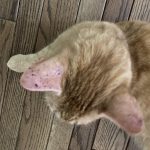Hello,
I’m sorry but we cannot advise on medications. That needs to be done with your vet. Also I think they can help treat this if you call them and ask for assistance. Best of luck. I hope the ears are better soon.
Scooter, my cat for over 21 years slept by my chest every night. He became sick earlier this year and had to be euthanized. Within days of losing him one of my other cats has decided to do everything in her power to keep me up at night. She will knock things over, turn off my cpap machine, etc. until I finally give in and get up and go downstairs with her. I usually will do stuff on the computer or straighten up. She usually just sits by me and after about 2 hours I can go back up to bed followed by her for about 5 or 6 hours. She is healthy, playful, friendly. Lately she has gotten worse and wants to be up more often. Tried locking her out of our room but she has clawed the carpet and the door. I cannot lock her in another room because she will do the same thing. I have been so exhausted that on a few occasions I have put her in the carrier for a few hours so I can get some sleep. She goes in willingly and makes bo noise while she is in there. I have tried to keep her up several hours before going to bed but nothing works.
Any suggestions. Oh she is about 10 years old. One odd thing is that if one of my other cats is sleeping with me which is rare, she will not bother me.
Thank you
Comments
Anyone know whether half a Xyzal tablet would be okay to give a kitty? (My spouse says “It’s the same as Zyrtec minus one stereo isomer,” whatever that means.) We currently give him half a Zyrtec when he gets super itchy, and it helps. Reason we are wondering is we have a huge bottle of Xyzal but no more Zyrtec.
He is treated monthly for fleas, does not go outside, and we’ve tried every way we can think of to help him other than meds. But sometimes he still scratches so much he makes his ears bleed, poor guy. The meds help him a lot.
Comments
Hi Christine Remines here. Sampson’s ears were bothering him so we cleaned them. They were dry and itchy so I put some dog nose moisturizer on them. Now they are swollen like they may have hematoma. Emergency vets on your answering machine … one has an 8-9 hour wait and the other isn’t seeing patients what should I do?
Comments
Hello!! I found Dr Krista’s YT vid (Stripes the cat re nasal polyps) while researching my kitty’s condition. I have had Percy out to Pet ER w. initial thick mucus that became tinged w. a bit of blood. He was prescribed Doxy to treat the infection… it wasn’t until during the course of treatment that he began the “snoring” at which point I rushed him back to Pet ER. Having limited funds and no experience w. these issues ever before, I opted for Labs (figuring that would be a start). Unfortunately, the results did not “tell me anything unusual” and I am not a vet. It was then that I learned about these polyps … and I feel confident that this could be what Percy is suffering from (unless there may be a foreign object obstructing his airway). At this point I have no dx!! I’ve been on the veterinary roller-coaster ride trying to determine the best course of action between my local vet (Dundalk Animal Hosp), Pet ER or another vet altogether… at this point not knowing the cause of his breathing issue or how much the costs may be… I guess I can understand why “estimates” can’t be given … I am just trying to determine the LESS COSTLY route and there seems to be no clear answer. My head is spinning and I want the best for Percy and to NOT have to lose him, that’s the bottom line… my heart is hurting as this was so unexpected!! Would it be possible to fit Percy into the clinic’s busy schedule ASAP?? I called this morning and was told that Monday is already full. Emily advised to reach out on Pawbly … I also sent a pm on FB.
I really need help, I cared for 2 cats last year both former strays, one Main Coon mix w. Hypercardiomyopathy and the other cancer of his paw which was eating away. Both these babies tore my heart in 2 but I did what I had to until it was time to journey on RIP… we had a family of 6 at that time along w. my deceased uncle’s dog. My Care Credit card was easily almost maxed out… my boys and I are pitching in together as many ways as possible for Percy. He is the last of our most recent feline family and I do NOT EVER want to stop caring for animals!! Thank you for my restored faith in humanity!! ~Love~ Shelley & Percy
Comments
My cat died outside the house with blood in her mouth. And I touched and look for any marks or injuries. There’s no mark she was hit by a car, or someone hit her. And she is not going to any other house. Please, someone, say it’s a natural cause. I was thinking about this whole day. I’m stressed because of this. I worried that someone did something to her. She lived with us for 13 years.
A few days ago she couldn’t eat and vomited time by time. So we took her to the vet, and they gave saline and a few injections. She was fine after that.
The only thing that happened is before she died, she sneezed continuously at night and morning when she is sleeping with me.
I can try to make up my mind if this is due to natural causes.
Comments
I have two puppies 7 and 8 months old I want to apply Revolution to one of them and I am afraid the other one while playing will lick it off and get poisoned what do I have to do separate them for how long or may be do something else
Comments
My foster cat, who I am now considering adopting, has been struggling to breathe properly for about 3 months now. He came into the shelter with a suspected URI. However, after months of treatment with antibiotics and a whole swath of other anti viral medications, the vet determined that he wasn’t getting any better and euthanasia is on the table. I want to get a second opinion before we make any drastic decisions. I am doing online research and suspect that perhaps he has a polyp, a tumor, or foreign object in his throat/nose.
While I am dying to explore these other solutions, the shelter told me if I adopt him and take him to a specialist costs could go up to $5,000. I don’t have that kind of money. I am in Olympia, Washington State. Does anyone recommend any veterinary hospital that is more affordable and can explore other resolutions at a more reasonable price? I don’t want to give up on him, but can’t afford to spend that kind of money.
Thank you so much.
Comments
Hello. A few days ago, I found a litter of five abandoned kittens. They have been determined to be between four- and five-weeks old. There are three females and two males, and they are all very social. They are eating and drinking well, and we are currently in the process of weening them from formula and kitten pate to moistened kitten kibble.
Unfortunately, on Sunday afternoon, one of the female kittens (who is named Princess Butterscotch) started to show signs of Coccidiosis. Being in the country like I am, I am very familiar with the signs of the parasite. I rushed her to the emergency vet on Sunday evening, where she was diagnosed with Coccidiosis. She was put on a starter dose of both Panacur and Albon for all parasites. I was also given enough treatment to treat the other four kittens at home, because common sense dictated that they were also infected, even if not showing signs. The four whom were healthy before are still doing well. They all get .25ML of both the Panacur and Albon every evening. The last dose of Panacur will be this evening, whereas the Albon was given in an eight-day dosage.
Princess Butterscotch still has diarrhea. It is to the point where she was “poopy butt” (as we so elegantly call it), and she does not always know she is going to the bathroom. She is still eating, drinking, playing, purring, and doing all things that kittens do; however, I am distraught, because as I said, I have seen Coccidiosis in kittens before and know how quickly it can take a turn for the worst.
In all my experiences and my family’s experiences, Albon DOES NOT WORK on Coccidiosis. And even if it temporarily stops the symptoms of Coccidiosis, they reappear within 24 hours of the last dose of Albon. However, it was all the emergency vet carried. I called my regular vet this afternoon for an appointment and to discuss Ponazuril as a possible treatment, as it is the only medication we have ever found to definitely treat a kitten with Coccidia. My vet could not see me due to having no appointments. I called another vet in the area, and they also cannot see me due to having no appointments. The emergency vet I took Princess Butterscotch to on Sunday evening is not open today.
My fear is that I am going to lose this kitten. I know Albon generally takes one to two days in order to really start showing signs of improvement; however, it seems she’s getting worse and not better. I am wiping up all of her little spots on the bathroom floor with bleach cleaner, and I am making sure their litter box stays clean. However, this will all be for naught if she does not make it. I am currently treating her with some Pedialyte in order to ensure she stays hydrated until someone can see her and possibly provide her and her littermates with more effective treatments against Coccidiosis.
Any advice in the meantime would be greatly appreciated. I have not had this litter of kittens long, but it is difficult not to get attached to such wonderful, loving creatures, and I would hate to lose one because I did not do all that I could to save her life.
Because I know this will be brought forth in mind, none of the kittens are showing ANY signs of Fading Kitten Syndrome. They are all very loving, active, and social. All of them, save for Princess Buttercup, are using the litter box regularly, and they are all eating very well.
Thank you for any and all advice,
One very worried pseudo-foster mother
Comments
HELP!!
I have a 3yo female Pom, Nomi, who is bullying our newly adopted female puppy, Ali.
Backstory: We had a senior Beagle (who recently passed away) and our current 3yo Pom. They got along very well tho the beagle was not in to playing with toys, he would play “wrestle” with Nomi. Nomi never had any aggression toward him (other than don’t go after my food) but she did like to boss him around….stay out of the garbage, don’t lick the dishes when the dishwasher is open sort of stuff. As said, our Beagle recently passed and we just (like yesterday) adopted a puppy, wanting to give Nomi another companion. Nomi is bullying the new pup; will not allow her to play with the toys…(.and we did buy new toys as we knew not to just give Nomi’s toys up for grabs)….will not allow her play freely, nips at pup if she makes sudden movements around her. Normally, Nomi is a very social dog with humans but has never been around dogs other than her beagle brother who was already here when Nomi came to us at 12 weeks old.
I need to know how to calm Nomi down and teach her it is ok for the new pup to play both with toys and in general. I need to know how to effectively “discipline” Nomi when she is mean to the pup without using tactics such as striking her or yelling. I have been giving her lots of praise in the moments when she doesn’t nip or growl at the pup, even treats. We’ve been very cautious to make sure we show Nomi affection right along with the new girl and we do not leave them alone together, and do not feed them together.
ANY help/advice would be so welcome as we want these two girls to get along and be pals for their sake and ours!
Comments
My sweet little Josephine is 2 1/2 years old and has herniated discs in her back and also has severe heart failure in the right side of her heart. I have to make the heartbreaking decision of whether or not to take the chance on anesthesia to repair the disc herniation since a week of sedation and pain medication has not produced any improvement on her motor skills (she can’t stand and poop or pee and her appetite is waning) and risk complete heart failure, or take her home and try other alternatives to back surgery. The doctors tell me that the results of the EKG tell me that I only have about 2 more years with my little girl given the condition of her heart. Do I do the back surgery? Are there successful alternatives?












Hello,
I’m sorry for the loss of your kitty. The veterinarian in me wants to say that you should start at the vets office. Assuming your cat is healthy isn’t enough of an assurance that they are. A thorough exam, full bloodwork and a urine with thyroid are all indicated in my opinion. Start there. If all of that is normal ask about trying a medication or pheromone like feliway. If all else fails consider (and consider anyway) getting a companion for your kitty to play with at whatever time of day or night they want to. If you cannot it will not get another cat you can either create train overnight or put her in a place she can’t bother you. But make sure you make up for the time apart by spending lots of time together during the day. No one wants to feel like they lost their two best friends.
Thanks so much for the quick response. I will be calling to set up an appointment with you. For some reason last night continuing into this morning was the worse.
Dr. Magnifico
I made an appointment for Princess to see you on September 8th. Thursday night into Friday morning she was the most “awake” that she has ever been. Last night though and into this morning she has been sleeping a lot. I was petting her to give her extra attention and I felt a lump on her belly. It is located more to one side and depending on her position close to her back leg. I spoke to someone at the clinic to see if anyone would have time just to feel it since there are no openings today. I don’t know if it is a fatty tumor, hernia, etc. but I am more concerned because she went from super awake to complete opposite in 24 hours. She is eating and using the litter box. If i cannot get someone to see her today I will bring her in tomorrow unless you think I should go to ER if no one can check her out today.
As always I appreciate and value your advice.
Thanks
Sandy